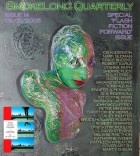Eugene Brusca had no opinions on anything. Each day at his home in Santa Monica, he read an array of arch liberal and staunch conservative editorials, then vice versa. Yet, at the end of each column, he inevitably concluded, “Wow, that’s a good point.”
For years, Brusca assumed he was not an opinionated person simply because all the really good opinions were taken. But when he found himself unable to come down pro or con on the subject of famine, he sought professional help. A world famous lab technician performed an MRI and CAT Scan and diagnosed Brusca with rare form of ambivalence. Alarmed, Brusca sought a second opinion but no doctor would see him without a first opinion.
Eugene Brusca was at wit’s end.
This was no time to be an American without a stash of fully loaded opinions. The nation was more divided than ever, with some predicting it may soon be sub-divided and turned into townhouses—another issue on which Brusca had no opinion.
Living in Santa Monica only made matters worse. With its myriad voter propositions and swarms of leggy socialists, this city was a known hotbed of activism where having no opinions on the great issues of the day was considered idiotic. Hence, Brusca’s effort to conceal his condition became a full-time job, although he could often work from home.
For years, Brusca assumed the local citizenry suspected something about him was slightly off but they were quite tolerant. When they’d ask his opinion on a topical issue and his vital organs would completely shut down, they’d usually give him the weekend to think about it. They graciously invited him to politically lively cocktail during which, Brusca desperately tried to steer conversation away from politics and back to cocktails. For this, he was widely admired in the fashionable seaside community as “a good listener” and “a pill.”
On the rare occasions he did try to contribute to political debate, the results were disastrous: When a neighbor opined that the war in Iraq cost too much money considering that some people right here in America could barely put food on the table, Brusca suggested that perhaps these people simply didn’t have the proper utensils. He was met with an unnerving silence and only through deft usage of the words “just kidding,” was he allowed to have dessert.
If that was a narrow escape, it barely compared to the recent national election when his cover was nearly blown altogether. Usually, after carefully reviewing the policies of rival candidates, Brusca would vote for whomever was taller. But after writing in Scottie Pippen for President, heavily armed agents from The League of Women Voters raided his home told him to cut it out.
Such close calls occurred regularly for Brusca since, between primaries, run-offs and propositions, Californians vote every Tuesday. His stress level grew steadily until finally, he pondered a move back to his native Detroit where, throughout his childhood, he was ignored by people of all races and creeds. Such an uprooting of his life would be a rash undertaking considering he’d just vacuumed, but frankly, he preferred the even more extreme measure of turning back the clock to a time when a good clump of the world lived under communist dictatorship. A land where one is not “entitled to his opinion,” would have suited Brusca well. A land where one is entitled to his opinion but is shot for saying it aloud, would have also been good. In fact, while watching the fall of the Berlin Wall in 1989, Brusca said, “Gee, I kind of liked communism. You know, except for the money part…”
(In retrospect, this was the most forceful opinion he’d ever voiced. Unfortunately, the acoustics in Berlin were poor at the time and the Germans only responded by saying, “Not now, I’m hammering.”)
While Brusca agonized over his decision, he stopped attending all local functions. He officially became a hermit by filling out some forms and re-naming his home “The Hermitage.” But issues of the day continued seeping into his consciousness: Governor Schwartzenegger may be doing a good job, although it’s possible he’s ruining the world. Healing our waterways sounds nice, but do we really want to shell out so much on cleaning supplies? There are pros and cons to activist judges. Choosing is the problem.
Then one day while Brusca was lounging on the fence in his backyard, there was a knock on his door. Brusca tried to pretend he didn’t hear the knock but he wasn’t that creative so he opened the door. It was a man from the Gallup Poll stopping by to ask Brusca if he had any opinions on anything. Caught off guard, Brusca said, “No,” to which the pollster said, “Thank-you for your time,” and went away.
Holy cow, thought Brusca, I blurted out my secret and… nothing. Have I been looking at my situation all wrong?
Emboldened, Brusca knocked on the door of his neighbor Mickey Fowler, a hyper-opinionated, left-wing billionaire who once described Mao as a “capitalist pig.” Fowler came to the door wearing a cumbersome metal brace on his knee and Brusca, sensing a good ice-breaker, said, “What’s with your leg?” Embarrassed, Fowler said, “I fell down the stairs of my Lear Jet and tore my ACLU.” He invited Brusca in for a drink then off-handedly said, “You know, Brusca, we’re destroying the planet.” Brusca replied, “Well, we’ll have to make do without it.” Fowler’s eyes narrowed, then widened, then went back to their normal size. “You have no opinions, do you, Brusca?” Brusca nodded his head and said, “No.” Fowler said. “Stay here a sec. I’m going to make a call.”
Fowler pulled out his credit card, picked up the phone and bought the Los Angeles Times. As his first order of business, he gave Brusca a job as a columnist. Every Wednesday and Sunday on the Op-ed page, fourteen column inches of utterly blank space appeared under the by-line of Eugene Brusca, for which he won the Pulitzer Prize. The Times increased his column to four days a week with no visible decline in quality. With his readership soaring, Brusca became a fixture on the lecture circuit where, at each lucrative speaking engagement, he would take the stage and say absolutely nothing, followed by a brief question-and-answer period. Rapt audiences never asked any questions, then stood for prolonged ovations. When local, national or international crises erupted, Brusca became a sought-after panelist for Town Hall meetings at which his repeated refrain, “Beats me” never failed to send audiences home feeling more at ease with a tumultuous world. In short, Eugene Brusca was fast becoming a household name. Even at places of business, some people knew his name. The Times increased his column to six days a week and sold its sponsorship rights to the Travel Bureau of Finland. Finally, after nearly two years, Brusca started to feel his completely vacant column was getting stale. His editors encouraged him with such classic journalistic phrases as, “Come on, Eugene,” and “Don’t be silly, Eugene.” But it was all to no avail.
Brusca took a leave of absence to re-charge his batteries but somehow he never got around to it. For a while, his editors called him everyday hoping he’d regain his inspiration. Soon their calls decreased to once a week, then back up to three times a week before diminishing to the occasional greeting card. Wars broke out, natural disasters ravaged cities, scandals rocked Wall Street, politicians sucked the marrow out of the state, poor people suffered, rich people slept late and Eugene Brusca gradually faded back into obscurity. Though sometimes he hung out in his den.



 The SmokeLong Grand Micro Contest (The Mikey) is now an annual competition celebrating and compensating the best micro fiction and nonfiction online.
The SmokeLong Grand Micro Contest (The Mikey) is now an annual competition celebrating and compensating the best micro fiction and nonfiction online.